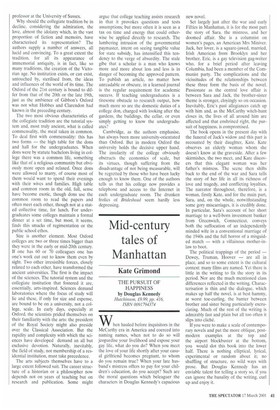Mid-century tales of Manhattan
Kate Grimond
THE PURSUIT OF HAPPINESS by Douglas Kennedy Hutchinson, £9.99, pp. 416, ISBN 0091794374 When hauled before inquisitors in the McCarthy era in America and coerced into naming names, when not to do so will jeopardise your livelihood and expose your gay life, what do you do? When you meet the love of your life shortly after your casual girlfriend becomes pregnant, to whom do you remain true? When your late husband's mistress offers to pay for your children's education, do you accept? Such are the moral questions which beleaguer the characters in Douglas Kennedy's capacious
new novel.
Set largely just after the war and early Fifties in Manhattan, it is for the most part the story of Sara, the mistress. and her doomed affair. She is a columnist on women's pages, an American Mrs Miniver. Jack, her lover, is a square-jawed, married, Irish American from Brooklyn and her brother, Eric, is a gay television gag-writer who, for a brief period after leaving Columbia, had been a member of the Communist party. The complications and the vicissitudes of the relationships between these three form the basis of the novel. Passionate as the central love affair is between Sara and Jack, the brother-sister theme is stronger, cloyingly so on occasion. Inevitably, Eric's past allegiances catch up with him and, as the McCarthy witch-hunt closes in, the lives of all around him are affected and that enshrined right, the pursuit of happiness, is compromised.
The book opens in the present day with the funeral of Jack's widow and this part is recounted by their daughter, Kate. Kate observes an elderly woman whom she doesn't know at the graveside. After a few skirmishes, the two meet, and Kate discovers that this elegant woman was her father's mistress. The scene then shifts back to the end of the war and Sara tells the story of her life in all its richness of love and tragedy, and conflicting loyalties. The narrator throughout, therefore, is a woman, firstly Kate, and for the main part, Sara, and, on the whole, notwithstanding some gory miscarriages, it is credibly done. In particular. Sara's account of her short marriage to a well-born investment banker from Greenwich, Connecticut, conveys both the suffocation of an independently minded wife in a conventional marriage of the 1940s and the full horror of a misguided match — with a villainous mother-inlaw to boot.
The political trappings of the period — Dewey, Truman, Hoover — are all in place, and so to some extent is the cultural context: many films are named. Yet there is little in the writing to fix the story in its period. Nor are the much mentioned class differences reflected in the writing. Characterisation is thin and the dialogue, which makes up half the novel, is at best hammy, at worst toe-curling, the banter between brother and sister being particularly excruciating. Much of the rest of the writing is admirably fast and plain but all too often it slips into cliche.
If you were to make a scale of contemporary novels and put the more oblique, postmodern examples at the top and the airport blockbuster at the bottom, you would slot this book into the lower half. There is nothing elliptical, lyrical, experimental or random about it; no shuffling of structure, no wild ways with prose. But Douglas Kennedy has an enviable talent for telling a story so, if you can ignore the banality of the writing, curl up and enjoy it.


































































 Previous page
Previous page